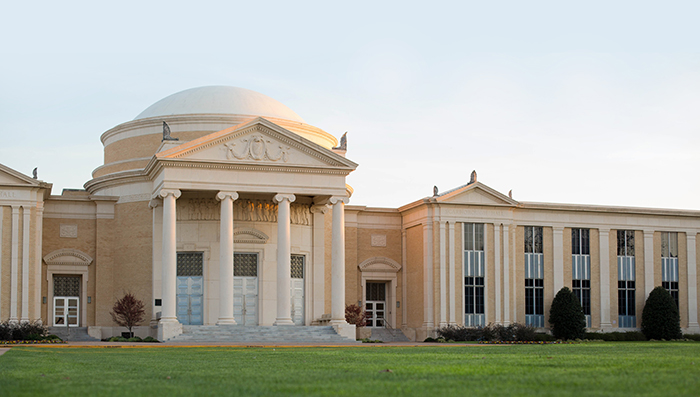Southwestern, TBC professors, students featured at ETS Southwest region meeting

Fifteen Southwestern Baptist Theological Seminary and Texas Baptist College professors and students presented academic research during the Southwest region meeting of the Evangelical Theological Society held on the Fort Worth institution’s campus, March 24-25.
There were 13 Southwestern and TBC professors who made presentations during the event on Friday and Saturday, which was led by Joshua Williams, associate professor of Old Testament and interim director of Research Doctoral Studies. Williams served as the program director of the regional meeting.
Among the Southwestern Seminary School of Theology faculty who presented research, Ted Cabal, professor of philosophy of religion, discussed various interpretations of Genesis 1-11 as found among evangelicals. His paper titled “Concordism and the Importance of Hybrid Models” discussed the historical reasoning for concordism, the idea that when reading the teachings of the Bible onto the natural world, when properly interpreted, will align with the teaching of properly understood science.
Cabal also shared various hybrid models of combining both natural science and biblical teaching to bridge the gap between the two areas of study. He concluded his research by acknowledging that concordism is controversial due to the increased ability to study scientific data more accurately but believes that hybrid models will continue to be offered because of evangelicals’ convictions about Scripture.
Andrew Jennings, instructor of apologetics, presented his research on the problem of evil in his paper titled “Is Conceivable Evil a Problem for God?.” Jennings discussed two different arguments for why God is not necessary by using the problem of evil and how these two arguments can be connected to provide a counterexample for those who do not believe in the necessity of a divine being.
The ideas expressed in his research were that conceivable evil is not the same as actualized evil. The arguments against God using the problem of evil stated essentially that conceivable evil is enough to breakdown the common idea for God, but Jennings states that these models do lead to skepticism and evangelicals should, at the very least, be suspicious of these models.
Jim Wicker, professor of New Testament, presented the paper, “Did the Sabbath Get Sabotaged? On Which Day Should Christians Worship?” which explored the ideas surrounding the Sabbath day in the Old Testament and how Christians changed the day of worship to Sunday after Jesus’s resurrection.
Wicker argues against Saturday worship noting a proper interpretation and translation of Scripture when it comes to key terms surrounding the day of worship, including “Sunday,” “The First Day of the Week,” “Everlasting Sabbath,” and “On the Third Day.” Wicker said there are evangelical groups who claim that Christians violated the Sabbath and replaced it with Sunday worship, but he provided biblical evidence for why Christians should, in fact, continue to worship on Sunday.
Wicker provided the history of the Sabbath and showed how Jesus addressed the misunderstandings of the Sabbath held by the Jewish leaders of His time. He also showed a brief history of worship occurring on the Lord’s Day, Sunday, and how there is ample New Testament evidence to support worshipping on Sunday. In his conclusion, he answered the question from the title of his research with a simple “no.” He said he believes that Christians are justified through the writings of the New Testament to continue to worship on Sunday.
Matthew McKellar, professor of preaching, presented the paper, “Alexander Maclaren’s Perspective on Greatness in the Kingdom as Reflected in His Expositions of Luke 6-7,” beginning with brief biographical information on Maclaren, which helped set up his discussion into his perspective found in his expositions.
After going through the different expositions of Luke 6-7, McKellar provided Maclaren’s definition of the Kingdom of God. He argued that Maclaren saw the Kingdom as a state of obedience to God, that it is embodied in Jesus, and that it is an order of things in which the will of God is supreme.
As his title suggested, McKellar next discussed the idea of greatness. According to McKellar, Maclaren saw Jesus as the sovereign arbiter of claims to greatness. He also saw greatness as a “matter of proximity to the King.” He noted that Maclaren compared the recipients of Kingdom greatness and little children.
McKellar provided his overall thesis for the research saying that it “argues that Maclaren’s perspective on greatness in the Kingdom as reflected in his expositions of Luke 6-7 is predicated on the authoritative pronouncements of King Jesus which emphasize position within the Kingdom and proximity to the King Himself.”
Other Southwestern-related presenters included:
-
- Brian C. Barry, “God’s Kingdom in the Doxological Speeches of Daniel”
- Tyler Bauer, “Calvinism and the Kingdom: Should Calvinists Be Optimistic Regarding the Scope of Salvation?”
- Craig Blaising, “Progressive Dispensationalism as Kingdom Theology”
- Jesse Erickson, “The Compatibilist Solution to the Problem of Middle Knowledge and Divine Inspiration”
- Coleman M. Ford, “The Supernal Homeland: Kingdom of God and the Ethics of Baptism in Augustine’s on Baptism”
- Braden McKinley, “The Pursuit of Purity in Early Christian Worship”
- Cole Peck, “Non-Israelites in the Chronicler’s Genealogies: An Exploration of the Role of Non- Israelites in the Identity of the Kingdom”
- Drew Smith, “Sketch for a Greater Glory Theodicy”
- Kevin Watson, “Modifying Stephen’s Law’s ‘X-Claim Argument Against Religious Beliefs’ in Terms of Religious Disagreement”
- Zelda C. Wolfe, “Theological Reading: Recovering Early Church Fathers and Premodern Perspectives”
The Southwest region meeting of the Evangelical Theological Society is an annual event that occurs each spring. The next Evangelical Theological Society national meeting is scheduled for Nov. 14-16 in San Antonio, Texas.



